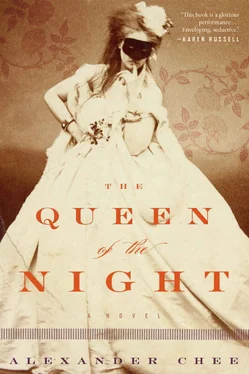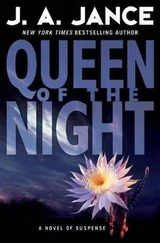But even then I knew, as puny as you are, your one consolation, should you be chosen by Fate, is that the god who chose you will feel the need to speak with you at the end.
No god teaches a lesson without this.
All of this, of course, is a prelude to some final transformation, one that begins in earnest once you push away thoughts of lessons and gods and their desires, and tell yourself you are mad to believe it and thus place yourself the more firmly in its grasp. But this last I did not yet know, and so I told myself I was mad to believe any of it, to even think of it, and I opened the window as if, in doing so, I could let all of these thoughts out.
The wind came in instead, so fiercely that the fire guttered behind me and the wind and sudden smoke together conspired and brought more tears to my eyes, but this time I let them stay — the wind slammed the shutters against the walls and threatened to shatter the glass if I let go for even a moment. The noise was such that I feared someone would come to see what the matter was, and yet I hoped they would not, for now I gave in and fully wept. There was a pleasure to it, even to the wind blowing through my suite, the smoke, and the banging shutters — all of me, for a moment, aligned, was honest, an emotion and my reaction matched. This consoled me, and as I sank into it, I found the grief beneath it, submerged until now, some deeper colder current underneath.
The woods below beckoned. They looked as if they led all the way to those other woods — as if, were I to enter, I could follow them and emerge on the other side of that mountain in that other garden, that last night in Compiègne — where I could slip down the days between now and then as if they were the backstairs to the world and to time itself, where I might find my composer coming on his way here to my window. Drawn in by the same power that had put me here, until he stood, below my window, in a salute.
How we all want to be Leonora. To go to the garden and find the love we thought lost to us singing his way out of the dark, having survived the war.
How had Leonora done this, living on just a single memory of one love over the years while another suitor made his case to her daily there in her own castle? I had been braver in Paris, with my fantasies of returning to him at the Bal Mabille, but now, by the edge of the Black Forest, I foundered. I wanted to see him that very night. While I did not know how to leave this room, I did not know how to stay, either. I knew it would destroy me to go to him that night as I wanted to, uncertain even of finding him; but the thought of staying here and thus somehow fating him to be the one to come here and die at the tenor’s hands, sealing him into this strange game of destiny, wasn’t this sending him to his death? And my own?
The only way to save him from that fate was to leave here before it came true. If this was what I feared it was, he should never come, never walk out of that forest; it was too dangerous. If there was a way to warn him that he should not come for me should his circumstances ever conspire… But this was the madness I spoke of before — I knew it even as I thought of it — even if I knew how to reach him, it would be a madwoman’s letter. He would not believe it. He might even try to come here to convince me it was not true and thus bring it all to fruition.
Where, to that end, would a letter find him? Where did he reside, and was he safe or in danger, a captive like me? If our little moment in the night had made me so valuable, he, under the direct caresses of the Empress, would have become much more so. Did she keep him in an apartment the way the tenor kept me or was there a golden cage, brought from palace to palace, in secret? Or a cave beneath Compiègne guarded by assassins? He was almost certainly a kept man or a prisoner, or both, and whichever was true, he would not be at the Bal Mabille come spring no matter what I hoped — his days of playing for whatever they paid were behind him. I knew from the Majeurs-Plaisirs of a house much like ours nearby, full entirely of men, and their clientele also almost entirely men, though it was said a few wealthy women availed themselves of them as well. I had never once tried to imagine this, but now I did, the composer at a piano in a salon, playing and waiting, amid laughter and champagne…
But the Empress would never risk such a thing, she in a domino on some velvet chaise looking on as others drank merrily around them both. She would never do this. His quarters were likely even more mysterious than any of this, and the more hidden.
There was only the very slightest chance he was still free. And if he would be there in Paris, at the Mabille come spring, the dream of our reunion would likely conclude with my being caught by the Comtesse’s agents, or the Emperor’s, or the Empress’s; and if any of them had not found him before this, I would lead them to him just by going to him.
How stupid I’d been to dream of it.
This world is not made for us to be together came the thought.
More ordinary ways of losing him intruded. I could lose him to another woman, or I had already lost him, or I was only a bit of fun in the garden to him; and all of this was only some ridiculous fever dream — the dream of a prisoner. All of the scenarios I imagined, extraordinary and ordinary both, ended with us apart.
The wind blew even harder as these scenes proceeded in front of my mind’s eye. I have gone mad , I told myself, this final self-betrayal, unforeseen and bitter — more bitter than the others. But as the wind surged, that sense of madness ebbed, and what returned was the very real feeling of the outline of that god’s hand, as if the wind were the very heel of that hand pressed to my face.
I was not mad.
If I can be with him, let me be with him, I said, into the fingers of the wind. Make me your plaything; do as you will. But do not give me all of this and not him as well. Do not make him the price I must pay; I will not pay it.
I waited, fearful for a moment, as if I might hear a response. And how would I refuse? I wondered to myself. I knew only that I would. And I knew only one way that I could. This little game would end if this Leonora died before her lover’s capture.
I will not pay it, I said again. I will pay some other price.
As if in answer, one last monstrous gust of wind blew so that the fire behind me was snuffed and I nearly let the windows go, but then it left as suddenly, leaving the air strangely still. Frightened, I shut the windows and fastened them. I made to close the shutters as the sun went behind the mountains, the sky darkening all at once like a lamp blown out, and as I did, the fire in the grate returned to light the room so that the view outside was obscured by my reflection, looking much as I had that day at the train station in Compiègne.
I have told you that I kept the general’s coat from that fateful journey because it suited me, and it did; and I have said I kept it because it was warm, and it was. But there was another reason, of course, one I was only faintly aware of myself until I saw myself reflected here — I’d kept it because it reminded me of him. This was the coat I’d worn that evening when my escape brought me to him, the night I’d decided the only path back to him led away from him first. It seemed lucky to keep it, as if wearing it had a magic that could help me find my way to him again — as if it could keep us both safe until he could take it from my shoulders again. That night, when he’d leapt out of the woods and landed in front of me, he could have landed anywhere, anywhere at all, but instead, he was there, as was I, and I could not have made my way there dressed any other way. When I wore this coat, I felt confident the spell survived, confident of moving to his side like some slow arrow shot through the dark by Cupid himself, that tiny marksman. I would find him, I would; I just needed to be patient and wait.
Читать дальше












